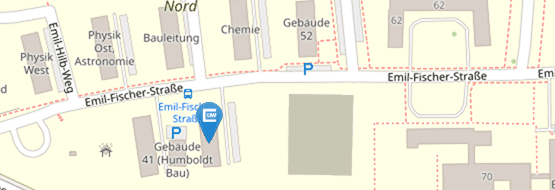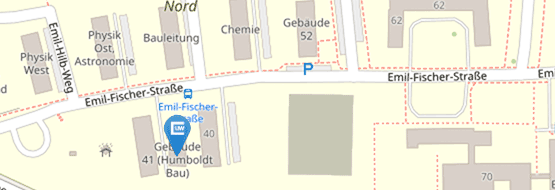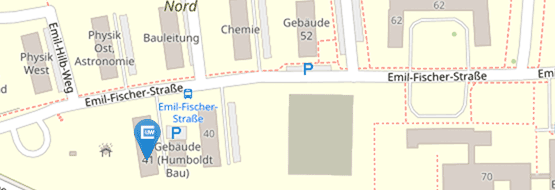Mathematical Physics (Master)
Master's degree programme in Mathematical Physics
| Degree: | Master of Science |
| Target duration: | 4 Semester |
| Academic term: | Summer and winter semesters |
| Admission | Free admission, but subject-specific admission requirements |
| Credits: | 120 ECTS points |
| Target group: | Successful graduates of a Bachelor's degree program with a focus on Mathematics and Physics, who are interested in specializing in Mathematical Physics |
| Qualification targets: | Qualification targets Master Mathematical Physics (120 ECTS) |
| Accreditation: | program accredited till September 30, 2028 |

Mathematical physicists will
- learn advanced mathematical methods and techniques of theoretical physics
- acquire a depth knowledge in the field of theoretical physics
- independently be able to classify and solve questions of mathematical physics
A study of Mathematical Physics promotes
- abilities related to abstract thinking
- skills to address complex issues
- perseverance and creativity in solving problems
The Bavarian Higher Education Act (BayHSchG) requires a "special qualification" for enrolling in a Master's degree program.
For the Master's Program Mathematical Physics at the University of Würzburg, the substantive requirements are essentially:
- Degree in a Bachelor's program (with 180 ECTS credits) in Mathematical Physics or a comparable degree program,
- Competencies amounting to at least 30 ECTS credits in the following sub-areas of mathematics: calculus (differential and integral calculus in one and more variables) and linear algebra.
- Competences amounting to at least 10 ECTS credits from other branches of mathematics, e.g. ordinary differential equations, partial differential equations, geometric analysis, differential geometry, functional theory, functional analysis, numerical mathematics, stochastics, optimization, et.
- Competences amounting to at least 21 ECTS points in the following areas of theoretical physics: classical mechanics, quantum mechanics, statistical physics and electrodynamics.
- Competences amounting to at least 19 ECTS credits from other branches of Experimental or Theoretical Physics.
- Competences amounting to a further 30 ECTS credits from any field of Mathematics, Experimental or Theoretical Physics.
- A thesis with a minimum of 10 ECTS credits in Mathematical Physics, Mathematics, Phyics or a comparable degree program.
To enable an uninterrupted transition from undergraduate to postgraduate study, a "conditional" admission can be applied, provided that one of the degrees mentioned in point 1 above can be used to prove the acquisition of 150 ECTS credits as well as the awarding of a corresponding thesis in 7. The requirements mentioned from 2 to 6 must be achieved in any case. For a final admission to the Master's degree program in Mathematics, the requirements listed from 1 to 7 must be submitted before the end of the registration deadline for the third semester.
Deadlines
The following deadlines must be met:
- Until July 15 (if applying for the winter semester) or until January 15 (if applying for the summer semester), an online application must be submitted under WueStudy. JMU students can use their JMU account, external applicants must first register for an applicant account. (Since December 9, 2021, the online application will no longer be made on the JMU Master's portal.)
- Until September 15 (if applying for the winter semester) or until March 15 (if applying for the summer semester), proof of first degree or proof of performance can be submitted later.
Attention: application for a semester after the deadlines July 15 and Januar 15, respectively, is not possible. On the other hand, documents can be submitted by the second specified deadlines. After receiving your online application on the Master-Portal, we will contact you by e-mail and let you know the status of your application.
Information and contact
If you have any questions about the aptitude test, please contact the study advisors for Mathematical Physics.
Mathematics and Physics are two of the major sciences of our society, that are developed both for the sake of knowledge as well as for addressing direct applications in real life. Therefore, a general study of Mathematical Physics can provides an essential introductory knowledge that promotes
- ability related to abstract thinking,
- profound competencies in the fields of mathematics and physics,
as well as the ability
- to get quickly used to complex contexts,
- to localize the essential elements of a problem,
- to find creative solutions.
This "complete package" provides you with excellent job prospects and the ticket to numerous fields of application in industry, science and research.
Structure
The Master's program in Mathematical Physics is divided into three sections: compulsory Mathematical Physics (20 ECTS), compulsory and elective subjects of Mathematical Physics (50 ECTS) (that are subdivised into Mathematics, Physics and applications) and a final exam (50 ECTS) which is related to a master's thesis (30 ECTS)
Specifying a course of study course makes little sense here, since there are only two compulsory modules (see module overview). We recommend to do these modules during the first two semesters (regardless of the beginning of study in summer or winter), as there is no dependence between them.
Control test
A control examination does not exist in this master program.
Thesis
If you have earned 120 ECTS credits under the Examination Regulations, you will receive the academic degree of Master of Science.
Study and examination regulations
- General Study and Examination Regulations for Bachelor and Master Courses (ASPO)
- Subject-specific provisions for the Master's program Computational Mathematics (PO 2016)
The examination board is u.a. responsible
- Recognition questions at the beginning of studies for achievements acquired in previous study programs or at another study location,
- Recognition questions in the current study
- Gender Equality
There are three subsections in the Master program of Mathematical Physics, which are subdivided as follows:
- Compulsory subjects of Mathematical Physics (20 ECTS)
- Analysis and geometry of classical systems (10 ECTS)
- Algebra and dynamics of quantum systems (10 ECTS)
- Elective subjects of Mathematical Physics (50 ECTS)
- Subcategory Mathematics (at least 8 ECTS)
- Subcategory Physics (at least 8 ECTS)
- working groups (minimum 10 ECTS)
- Graduation (50 ECTS)
- Subject Specialization in Mathematical Physics (10 EcTS)
- Methodological Knowledge and project planning in Mathematical Physics (10 ECTS)
- Master thesis (30 ECTS)
A list of all possible modules for the subcategory of mathematics, physics and working groups can be found in the subject-specific regulations and in the module handbook.
The modules related to the specialization in mathematical physics as well as method knowledge and project planning allow to prepare the master thesis and are selected in agreement with the supervisor. In addition, we would like to draw your attention to the Learning by Teaching module from the Mathematics sub-section (see below). You can find out more about the current event offer in the course catalog.
Learning by Teaching means supervising an exercise or tutorial group in the bachelor's program under the guidance of the respective lecturer. This can be done twice for every 5 ECTS.
These modules require appropriate skills. Application is made directly to the teaching coordinator.
The master's thesis is the last major exam in your master's program. This written work is designed to show that you are able to work on a problem of mathematical physics within a defined period of time (six months).
The modules of specialization as well as the methodological knowledge and the project planning are required for the preparation of the master thesis. Furthermore, their successful completion requires the registration of the Master Thesis. You are advised to start your Master thesis at the latest before the beginning of your 6th semester, so that you can use the full remaining time to complete the work before the beginning of your 7th semester. After the beginning of the 7th semester, your master's degree program is considered failed for the first time!
The topic of a master's thesis usually is selected from a seminar or a working group. You should personally contact a lecturer in mathematics or physics in accordance with your interests and decide directly on a subject (your own suggestions are possible!). Potential supervisors are all lecturers in mathematics and physics.
If you have found a supervisor and a topic for your thesis, print out this form, fill it out together with your supervisor and hand it in to theService center of Mathematics (eg Ms. Schmid, Mathematik Ost, Zi. 00.016) or in the Service Center of Physics (Physik, Zi. B-024). This will make the topic of your thesis and the date of submission (date of issue of the topic + 6 months) official and binding.
Only in very restricted cases, the processing time can be extended upon request to the Examination Board and in consultation with the supervisor.
The thesis has to be printed three times and stored on an electronic medium "in a common format and in readable form" (pdf file on a data CD is a viable option). It then must be taken to the examination office and to Mrs. Feineis. There, compliance with the processing time is documented and your work is passed on to the designated reviewers.
There is no colloquium for the Master Thesis.






